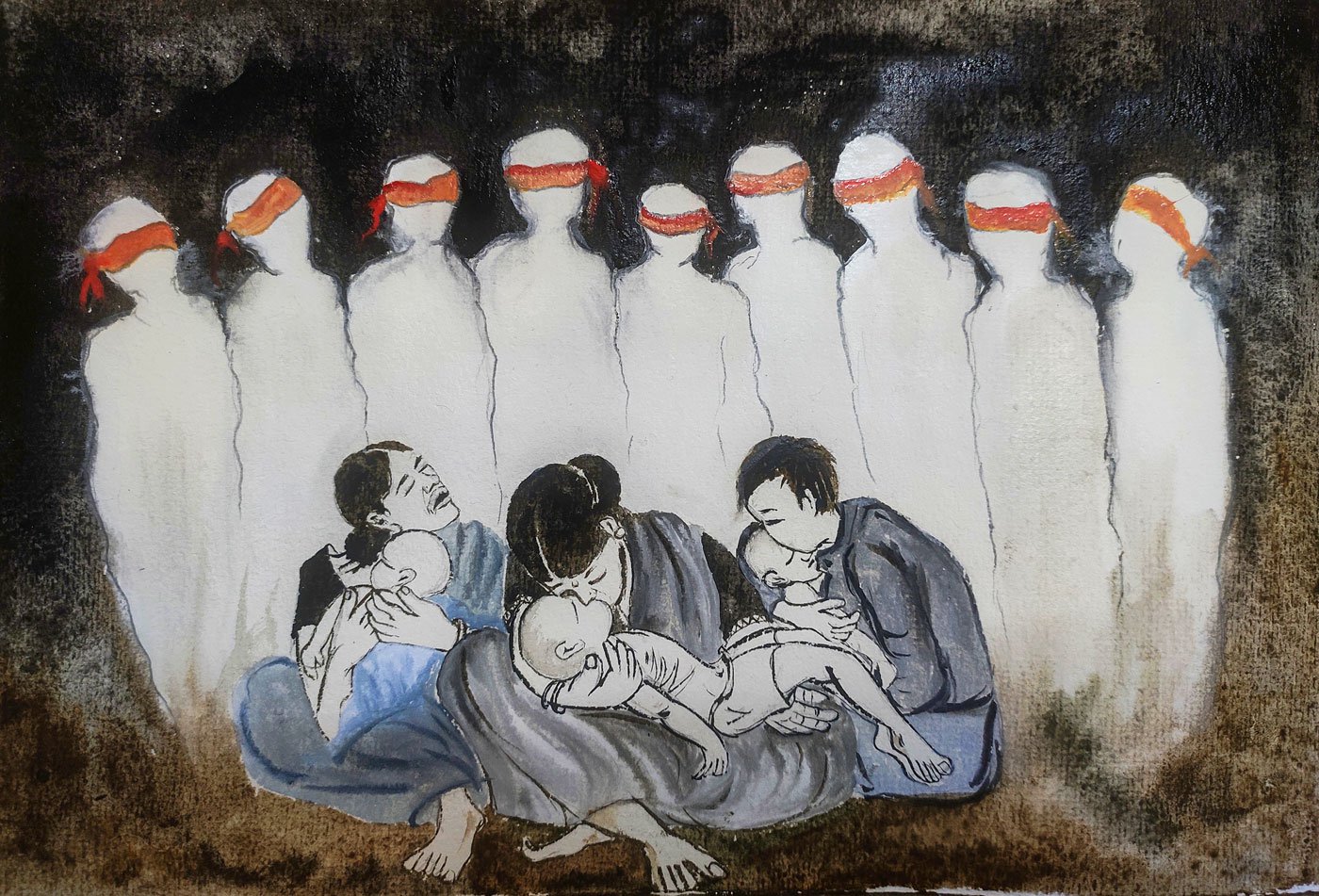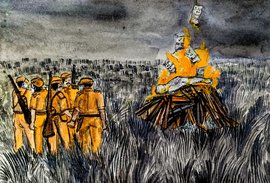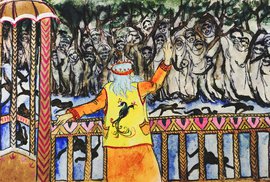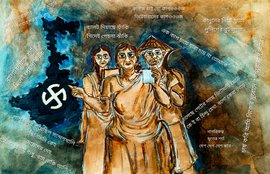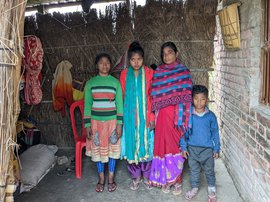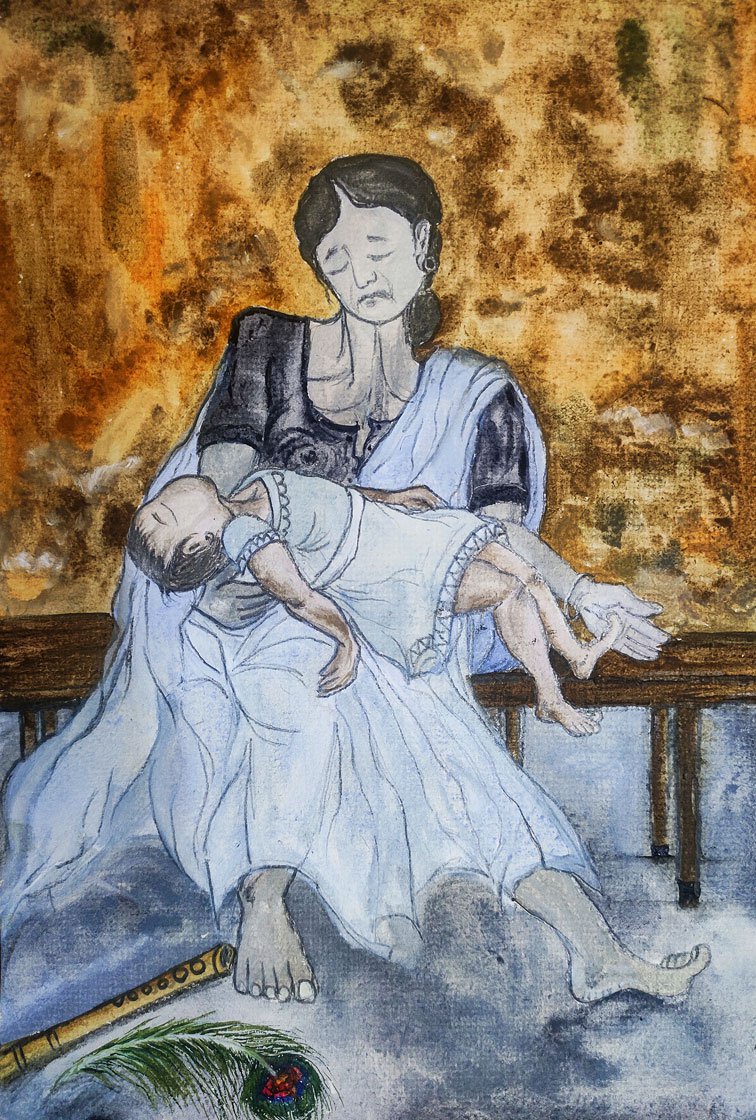
It was the eve of Janmashtami . Krishna had heard that the people of Aryavarta celebrate the occasion of his birth with much pomp and spectacle. Children dressed in holy yellow, colourful processions in the streets, kolams in courtyards, Krishna -lilas in temples, breaking of dahi-handis , joyous dance-performances, all festivities lasting till midnight. This day, he wanted to be a part of it all.
He descended to earth in disguise and walked around familiar places, enjoying the festive sights and sounds. When, suddenly, nearing the city of Gorakh he heard someone moaning in agony. Reaching the source of that horrible sound he saw a man, a little corpse in his arms, trudging across a hospital compound. Krishna’s heart broke. “Oh dear! Who are you in such pain?” he asked, “and who is this child in your arms?" With a thousand-yard-stare the man replied, "You arrived too late, my Lord! My son just died."
Overcome by guilt, Krishna decided to stay with the bereaved father and accompanied him to the burning ghat . A grislier sight awaited him there – hundreds and thousands of dead bodies of children in little heaps of white lined up the ghat. The inconsolable wails of mothers, the seething pain of fathers thumping their chests. He wasn’t prepared for it.
Where were the fancy yellow dresses? What macabre festival was this? Which Kansa condemned these young ones to such an ungodly fate? Whose curse was this? Whose kingdom? Whose orphaned people?
क्या इस नगर के बच्चे यतीम हैं ?
1. कैलेंडर देखिए
अगस्त आता है और बीत जाता है
जिनसे नहीं बीतता, उनकी आंख से बहता है
कांपते हाथों से गिरता है और टूट जाता है
नाक के भीतर सांस को नहीं घुसने देता
दम छीन लेता है
कुछ का दुःस्वप्न
कुछ के गले की फांस
मेरे गोरखपुर की मांओं का
लाल है
अगस्त कुछ के लिए पूरा साल है
2. पर मांओं का डर सही नहीं है सब कहते हैं
बापों ने भी झूठ कहा था सब कहते हैं
अस्पतालों में प्राणवायु नहीं मिलने की बात,
एक मुग़ल आक्रांता की साज़िश थी
असल में तो इतना ऑक्सीज़न मौजूद है
कि हर गली-नुक्कड़ पर
ऑक्सीज़न खींचती और छोड़ती दिखती हैं गौ माता
इतना सुलभ है कि अब तो ऑक्सीज़न का नाम सुनते ही
घुटने लगता है दम
3. ये किसके बच्चे हैं जिनके चेहरे यतीम हुए जाते हैं
ये किसके बच्चे हैं जिन्हें नालों में पैदा हुए मच्छर काट जाते हैं
ये किसके बच्चे हैं
जिनके हाथों में बांसुरी नहीं
कौन हैं इनके मां-बाप
कहां से आते है ये लोग....
जिनकी झुग्गियां दूसरी दुनिया
की झांकियों में शामिल नहीं होतीं
जिनके घरों में रात के आधे
पहर कृष्ण अवतार नहीं लेते
बस पैदा हो जाते हैं
और इन्हें ऑक्सीज़न चाहिए!
चाहिए इन्हें अस्पताल के बेड!
कमाल है!
4. गोरख की धरती फटने को है
कबीर शोकनाच में लीन हैं
आग की लपटों में जलते हैं राप्ती के किनारे
जिस शहर को ज़ार-ज़ार रोना था
उसकी आवाज़ चुप है
सूबे के महंत का कहना है
देवताओं की प्राणप्रतिष्ठा
बच्चों की बलि मांगती है
Are the children of this city orphans?
Look at the calendar,
August comes and goes…
For some it flows, like tears from the eyes
For some it falls from their trembling hands and breaks
An obstruction in the nose,
it suffocates and kills.
For some a nightmare,
For some a noose,
For mothers of Gorakhpur
it’s fear in the womb
For August is one long year
with no end near.
The mothers’ fears are wrong, they say.
The fathers are liars, they say.
The talk of no oxygen in the hospitals
was a conspiracy of the Mughals.
In truth there is such an abundance of oxygen
at every street corner, at every lane;
Gaumata breathes and exhales oxygen.
In fact it is the excess that kills.
The very word suffocates.
Whose children are these, who seem orphaned?
Whose children are these, bitten by mosquitoes
from open sewage drains?
Whose children are these
without a flute in their hands?
Whose children are they?
From which world do they come?
Whose slums aren’t included in the floats
from another world?
In whose homes does Krishna not incarnate himself
in the middle of the night
but just tumbles into the world.
And they ask for oxygen
and a hospital bed?
How strange!
The land of Gorakh is about to explode.
Kabir is marooned by sadness.
The shores of Rapti are engulfed in flames.
The city that should have howled
lies in stunned silence
The Mahant of the province believes
it asks for the consecration of the idols
It asks for the sacrificial blood of our children.
Glossary
Aryavarta : A term that has been used differently in the Indian context at different points in history and has expanded to the entire subcontinent. It represents the land of Vedic culture, of Ramayana and Mahabharata, as well as of Buddha and Mahavira
kolams : A Tamil term for straight or curved line threshold designs made from finely ground rice flour paste
dahi-handis : Earthen pots filled with Krishna’s favourite yogurt. On the day of Krishna Janmashtami these pots are hung from a height and young boys and girls form human pyramids and break them as a way of celebration
Kansa : Lord Krishna’s uncle and the ruler of Mathura, who killed many infants, including the children of his own sister, to protect himself
Gorakh : A 13th century leader and founder of a monastic sect known as ‘Nathas’. Poems attributed to him have come to be known as ‘Gorakh Bani’
Rapti : A river in the eastern region of Uttar Pradesh on the banks of which Gorakhpur is situated
Kabir : A mystic poet-saint from the 15th century
We thank Smita Khator for her significant contribution to this team effort.
